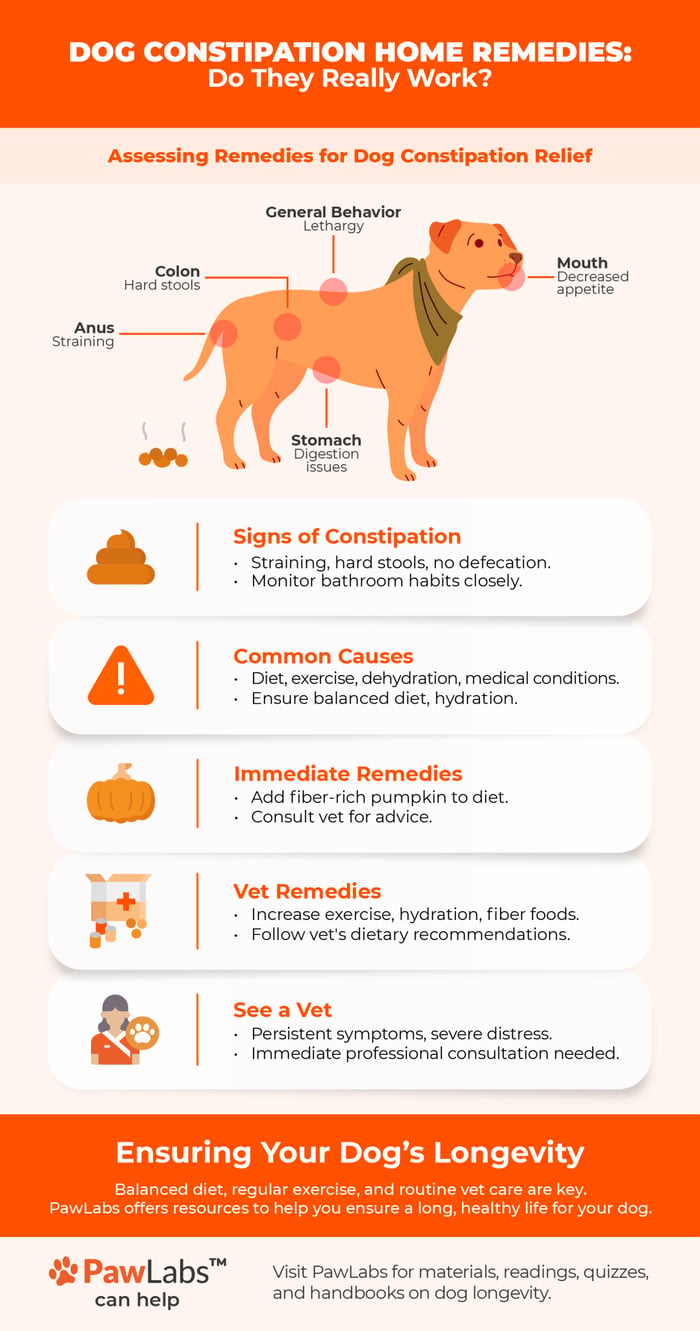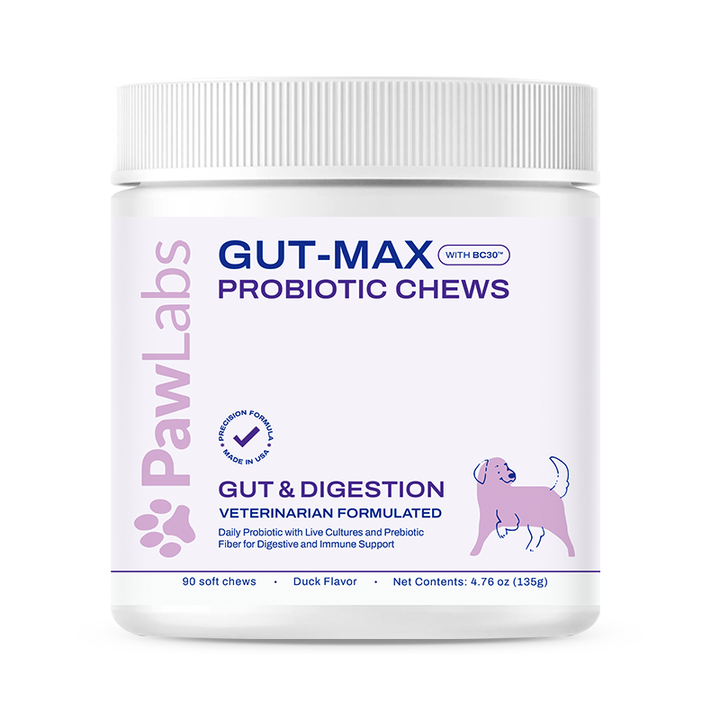Dog Constipation Home Remedies: Do They Really Work?
Assessing Remedies for Dog Constipation Relief

Assessing Remedies for Dog Constipation Relief
Dog constipation is a common issue that many pet owners will encounter. Understanding the signs and potential remedies is crucial for maintaining your dog's health and comfort. Dealing with a constipated dog can be stressful for both the pet and its owner. In this blog, we'll explore various home remedies and delve into whether they truly work for relieving your constipated dog. We will assess various home remedies for dog constipation, evaluating their effectiveness and safety, and providing expert advice on when to seek veterinary help.

What Are Common Signs That Your Dog Cannot poop?
Dogs with constipation often show clear signs of discomfort. These signs include straining to defecate with little to no success, producing hard, dry stools, or not defecating at all for days. Regular monitoring of your dog's bathroom habits can help you catch these signs early to address any issues promptly.
Dog constipation is often evident when they attempt to defecate without success, show signs of discomfort, or produce unusually hard and dry stools. Monitoring your dog’s defecation habits can help you identify constipation early, allowing for timely intervention (BetterVet).
Why Is My Dog Constipated? Understanding Common Causes
A variety of factors can cause constipation in dogs. These include insufficient fiber in their diet, lack of exercise, dehydration, and certain medical conditions like kidney disease or diabetes. Medications such as diuretics and antihistamines are also known to cause constipation as a side effect (BetterVet) (PetMD).
What Can I Give For My Dog Constipation Right now?

Immediate remedies for a constipated dog can include canned pumpkin, which is rich in fiber, and increasing water intake to help soften the stool. It’s important, however, to consult with a veterinarian before introducing new elements into your dog's diet to ensure they are safe and appropriate for your pet's specific health needs (Veterinary Emergency Group).
How Can Pumpkin Help a Constipated dog?
Pumpkin is a popular home remedy due to its high fiber content, which can help bulk up your dog's stool and make it easier to pass. Simply mix pure canned pumpkin (not pie filling) into your dog's food based on their size and weight. This is generally considered safe and effective for mild cases of constipation (Veterinary Emergency Group).
Pumpkin is beneficial due to its high fiber content, which can help bulk up stool and stimulate bowel movements. A tablespoon or two, depending on the size of the dog, mixed into their food can be an easy remedy to try at home (Veterinary Emergency Group).
Are Over-the-Counter Medications Safe for Dog Constipation Relief?
While some over-the-counter stool softeners and laxatives can be used for dogs, it is crucial to only use these treatments under the guidance of a veterinarian. Misuse of these medications can lead to further complications or not address the underlying cause of the constipation (Veterinary Emergency Group).
What Home Remedies Are Veterinarians Recommending for Constipated Dogs?

In addition to dietary changes like adding pumpkin, veterinarians often recommend increasing exercise and ensuring adequate hydration. If home remedies do not alleviate the symptoms, or if the dog shows signs of severe distress, a professional consultation is necessary to rule out more serious conditions (Veterinary Emergency Group).
Veterinarians often recommend simple changes such as increasing exercise, improving hydration, and adding fiber-rich foods like pumpkin to the diet. These can naturally help alleviate constipation without the need for medical intervention in mild cases (BetterVet) (PetMD).
How Can Diet Adjustments Alleviate Your Dog’s Constipation?
Adjusting your dog's diet to include more fiber-rich foods and ensuring they have constant access to water can help prevent and treat constipation. Foods specifically formulated for digestive health or those recommended by your veterinarian can also play a crucial role in maintaining regular bowel movements (Veterinary Emergency Group).
Dietary adjustments can have a significant impact on a dog's digestive health. Including more fibrous foods and ensuring ample hydration are key steps. Specialized veterinary diets may also be recommended for dogs prone to digestive issues (Veterinary Emergency Group).
When Should You Seek Professional Help for Your Constipated Dogs?

Professional help should be sought if home remedies do not resolve the constipation within a couple of days, or if the dog shows signs of severe distress such as pain, vomiting, or an inability to eat. These could be signs of a more serious underlying condition that requires immediate veterinary attention (BetterVet) (PetMD).
If your dog has not had a bowel movement in more than 48-72 hours, shows signs of pain, or you notice other symptoms like vomiting or lethargy, it's time to consult a veterinarian. Persistent constipation can sometimes indicate a more serious underlying condition that requires professional treatment (Veterinary Emergency Group).
The Importance of Dog Longevity
Ensuring your dog lives a long, healthy life is something every pet owner wishes for. Here's why focusing on longevity is so important:
- Preventive Health: Regular check-ups and preventive care can help catch health issues before they become serious.
- Quality of Life: A healthy diet, regular exercise, and mental stimulation contribute to a happier, more active life.
- Regular Exercise: Keeping your dog active helps maintain a healthy weight and supports cardiovascular and joint health.
- Mental Stimulation: Mental activities and training can prevent cognitive decline and keep your dog engaged and happy.
- Emotional Well-being: Strong bonds with family members and social interactions with other dogs and people can reduce stress and increase overall happiness.
- Strong Bond: The longer your dog stays healthy, the longer you can enjoy the rewarding bond you share.
- Cost Savings: Preventing diseases or treating them early can save on costly veterinary treatments down the line.
Gut-Max Probiotic Chews

Gut-Max Probiotic Chews

$59.95
$69.95
Veterinarian Precision Formula: 120 Million CFUs of Bacillus Coagulans FOS (Fructooligosaccharides) Fiber Probiotic & Prebiotic Microbes Vitamins and Enzymes 120 Million CFUs of Bacillus Coagulans Fructooligosaccharides (FOS) Fiber Natural Probiotic and Prebiotic Microbes Vitamins and Enzymes … read more
 SUCCESS!
SUCCESS!





